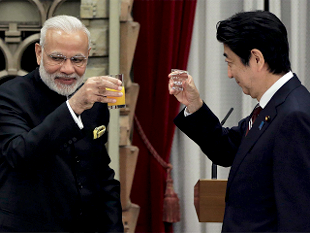Beijing, Nov 12: India will not become a "pawn" for Japan to contain China, a Chinese state-run media today said, accusing Japan of exploiting Sino-India disputes for its own interests.
 "Japan wants to use the disputes between China and India to court India to help contain China. Japan seeks to urge India to meddle in the South China Sea issue, even at the cost of changing its long-held position of reducing nuclear usage to offer special benefits of civil nuclear cooperation to India," Global Times said in an editorial on Prime Minister Narendra Modi's three-day visit to Japan.
"Japan wants to use the disputes between China and India to court India to help contain China. Japan seeks to urge India to meddle in the South China Sea issue, even at the cost of changing its long-held position of reducing nuclear usage to offer special benefits of civil nuclear cooperation to India," Global Times said in an editorial on Prime Minister Narendra Modi's three-day visit to Japan.
"Looking at Japan's diplomatic policies over the past few years, (Japanese Prime Minister Shinzo) Abe administration has become more active trying to sway regional powers to encircle China," the daily said.
It said that India is in need of acquiring nuclear and military technology from Japan and attracting more investment for its manufacturing industries and infrastructure, like high-speed railways.
The daily, however, said that India is not likely to change its position according to the wishes of Japan.
"India takes a multilateral approach to diplomacy and pursues a status as a leading power. Japan's plans are full of antagonism, which contradict India's policies. Therefore India will practically assess specific cooperation with Japan case by case," the daily said.
"India will not become a pawn for Japan to contain China, as it wants to become a power on par with China and Japan and benefit from both sides. India will get closer to Japan but will not enter into a brotherhood relationship," it said.
The editorial, which was apparently written before India and Japan issued joint statement yesterday, said that "both sides hinted they would include the South China Sea Arbitration in their joint statement".
India and Japan yesterday sought a peaceful solution to the territorial disputes in the strategic South China Sea, saying parties involved in the matter must not resort to "threat or use of force", in remarks that could anger China which is opposed to any outside interference.
There is no official reaction by China yet about the outcome of Modi's visit, but ahead of his visit Chinese foreign ministry spokesman Lu Kang told media that New Delhi and Tokyo should respect the legitimate concerns of their neighbours.
A Chinese state media report on Wednesday warned India that it may suffer "great losses" in bilateral trade if it joins Japan in asking China to abide by an international tribunal's ruling quashing Beijing's claims over the SCS.
China has been making aggressive advances in the strategic region - parts of which are also claimed by Vietnam, the Philippines, Taiwan, Malaysia and Brunei - by rapidly building artificial islets that experts fear could be potentially used as military posts.





Comments
Add new comment